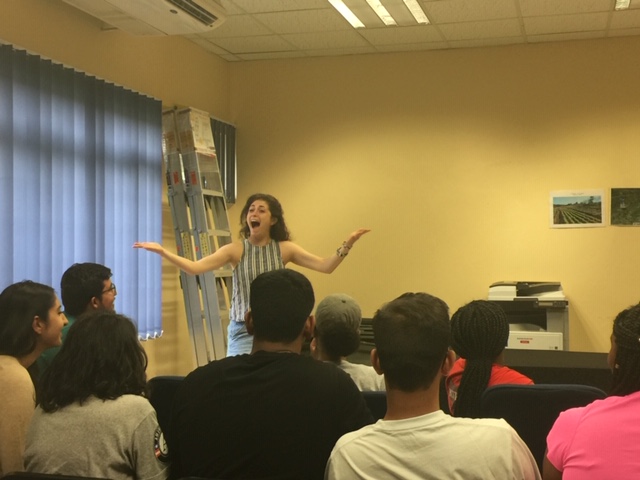Francesca Petrucci

Francesca may call herself “annoying,” but we prefer to think of her as immensely thoughtful, dedicated, and, for lack of a better word, woke. She’s using her talent for journalism, comedy and education to speak out against the patriarchy and engage men and boys (including none other than Tucker Carlson) in feminist conversations. And after graduation, whether she ends up pursuing a PhD in psychology or opening a vegan food truck, we have no doubt Francesca will continue to shake things up.
Age: 21
College: Rutgers University
Major: Journalism and Media Studies
Expected Graduation Year: Spring 2019
Website, Instagram
How did you first find your passion as an educator? How do you hope to continue to impact people’s lives through education in the future?
“Education is like the bumpers on the bumper car that keep everyone from dying.”
We are constantly influenced. Information subconsciously affects our perceptions and worldview. Media, advertisements, television, school, family and all that surrounds us leaves a mark. We are literally in the Matrix from the point of utero. Education is the tool which discerns the endless flow of information, let’s say into bins labeled “fake news” or “trying to get me to feel self-conscious so I will buy a product.” Education is like the bumpers on the bumper car that keep everyone from dying. It was when I entered college and became immersed in a variety of interesting courses instructed by inspirational educators that my interest in education developed. Not to sound like an annoying millennial who experienced a “life changing” study abroad program, but going to college allowed me to unearth so much knowledge. The more I learned, the more I was reminded of how much there was to learn. It is my hope to not only educate but inspire students to enjoy learning and to really become knowledge seekers rather than depositories of information. Creating an active citizenry who is socially aware and conscious is extremely valuable. I aim to do this through creative lesson planning, some dancing, writing, and through always encouraging people to ask one simple question: “Why?”
Why is comedy such an important tool in tackling contentious social and political issues?
The median age for a traditional news viewer is 63. No one watches traditional news anymore and newspapers are dying. Couple this with an insatiable appetite for entertainment, you have the millennial and GenZ news consumer. Comedy is how our generation digests information relating to social and political issues. It is also a way to “hide the broccoli” so to speak, since you are learning important information while enjoying yourself.
You’ve been engaged in looking at the roles of men and boys in the women’s movement. Why are men and boys of such importance to the women’s movement? In your opinion, what would the best strategy be to engage them?
How can we achieve full equality when half of the population is left out? This is the question at the forefront of women’s equality. Inequality is a problem that should be dealt with by both men and women in order to achieve its eradication. There are a variety of ways to engage men and boys in this discussion, but I think one of the best ways is through mentorship and education by men. When another male is able to deconstruct the concept of gender and masculinity and question what it means to “be a man,” it enables men to reflect on these questions and challenge these concepts.
What has your involvement in different forms of media, from your bi-weekly column “The
Annoying Vegan Millennial” to your role as Assistant Director of Marketing and Outreach
for the Rutgers University Programming Association, taught you about the importance of
understanding and utilizing media in our day-to-day lives and in talking about difficult
issues?
Media is a mirror that is constantly tinted, distorted, and slanted. Every story has a different lens depending on who is projecting the narrative. With the consolidation of media by for-profit corporations, it is increasingly important to understand these different lenses. We must understand who is telling the story, why, and, most importantly, for whose benefit. If pictures of dogs on scooters gets more clicks and thus generate more revenue, well you might see more of Fluffy than you do of Glyphosate and the cancer-causing chemicals in RoundUp herbicide. But, hey, dogs are okay, too. Just read Noam Chomsky, that’s all.
“Every story has a different lens depending on who is projecting the narrative.”
What advice do you have for college-aged women looking to get involved in journalism?
There is always a story to tell. The line between citizen and journalist is blurring with the growing speed of new technological innovation. You no longer need to pitch ideas to a news outlet, be assigned a story and wait for it to be published in a newspaper. You can create your own platform and audience to engage with. Figure out what interests you and write about it, ask people questions and just do it up, girl!
What are your main goals for after graduation?
“The line between citizen and journalist is blurring with the growing speed of new technological innovation.”
I have three routes that I am toggling between. I either want to go to graduate school and pursue a PhD in media studies, psychology or gender studies, continue auditioning and performing in comedy and theater groups, or open a vegan food truck. I can probably get it all done, right?
What is your favorite inspirational quote?
“One person’s ‘annoying’ is another person’s ‘inspiring and heroic.’” -Leslie Knope
How would you describe yourself in five words?
Fickle, Rad, Annoying, Nerdy, Vegan
Elizabeth is a second year student at Durham University, studying Sociology and Anthropology. She is currently a News x Social Media Intern at HC headquarters in Boston and has been involved in the Durham University chapter of Her Campus since January 2018.



